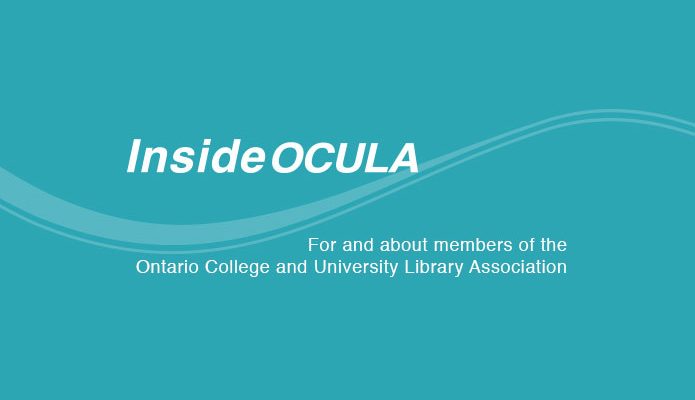
Sabbatical Reflections
 My last column as OCULA President, in the Winter 2013 issue, focused on the benefits of taking time out of our busy days to read and reflect. At the time, I was on a research and study leave (aka sabbatical), so I was doing a lot of reading, reflecting, questioning and writing. In the spirit of reflection, I would like to share some insights from my 11-month leave — thoughts that I am trying to keep in mind now that I am back to my regular working life on campus.
My last column as OCULA President, in the Winter 2013 issue, focused on the benefits of taking time out of our busy days to read and reflect. At the time, I was on a research and study leave (aka sabbatical), so I was doing a lot of reading, reflecting, questioning and writing. In the spirit of reflection, I would like to share some insights from my 11-month leave — thoughts that I am trying to keep in mind now that I am back to my regular working life on campus.
1. It’s good to stick to what you know — and then branch out.
My research interests are related to librarians’ professional identities and librarians’ roles as practitioner-researchers. Attending the CAPAL (Canadian Association of Professional Academic Librarians) and CAIS (Canadian Association of Information Science) conferences in May, at the end of my sabbatical, I had the exciting realization that all of my work in those areas has made me intimately familiar with the literature and scholarship in a way that I wasn’t before my sabbatical. Familiarity with the topic also made it easier to work with new approaches to my research, and for the first time I took on a deeply theoretical project. Successfully tackling that project was a very rewarding achievement. Now, I’m even more committed to continuing to focus on and expand within these areas. This has made it much easier to say ‘No’ to requests or suggestions to work on other research topics, which leads me to my second insight:
2. You don’t have to do it all.
I have a hard time saying ‘No’ and not volunteering to help with projects and committees. But while I was on sabbatical, I couldn’t volunteer or say ‘yes’ to most things. I felt better than when I gave in to the culture of “busy”, so I am trying to remind myself that my professional life won’t suffer if I’m selective, and that I will still have plenty of work to keep me interested and occupied.
3. It’s (usually) not as urgent as you think it is.
In the moment when a request or a suggestion is made that requires action, it can seem like it really matters and that it really matters now. I’ve learned that it’s okay to wait a day or two before responding and that things sometimes resolve themselves without my intervention. The work we do as academic librarians is important, but much of it isn’t urgent and can benefit from a more relaxed and thoughtful approach.
These three insights have already helped me take a slightly slower pace in my work life and I hope they will also make it easier for me to take time to read and reflect. In the Winter 2013 Presidential Poll, just over half of our respondents agreed that they were at least somewhat good at making time to read and reflect on professional issues:
I feel like I’m good at making time to read and reflect on professional issues
Agree 17%
Somewhat agree 39%
Neutral 5%
Somewhat disagree 28%
Disagree 11%
This is encouraging! For the rest of us, we know there is room to improve. I hope that these insights from my sabbatical can provide a spark of motivation for you to approach your work more purposefully and thoughtfully.
Kristin Hoffman is Head, Research and Instructional Services, D.B. Weldon Library, Western University.
If you’re interested in my research in these areas, please see my most recent publications and presentations. See also Pam Ryan and Denise Koufogiannakis (2007) “Librarianship and the Culture of Busy.” Partnership: The Canadian Journal of Library and Information Practice and Research, 2(1).


